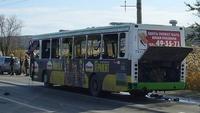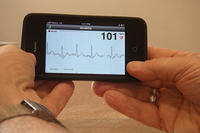-
Remote explosives detection may see the end of full-body scanners
Standing in a full-body scanner at an airport is not fun, and the process adds time and stress to a journey. It also raises privacy concerns. Researchers now report a more precise and direct method for using terahertz (THz) technology to detect explosives from greater distances. The advance could ultimately lead to detectors that survey a wider area of an airport without the need for full-body scanners.
-
-
Testing vibration caused by high-speed trains
New high-speed train lines are likely to be built as cities grow, and one problem planners have foreseen is vibrations in the ground caused by trains passing at speed. While these vibrations would probably be too small to damage buildings, they could disrupt the work of buildings such as a hospital by affecting sensitive equipment. Scientists have developed a new model to predict how much a new high-speed railway would shake the ground around it, and the effect this could have on those living near the line.
-
-
DHS warns airlines of renewed shoe-bomb risk
DHS has alerted airlines flying to the United States to the possibility that terrorists might try to bring explosives n board in their shoes. The airlines were told that there were no specific plots, and that the information was based on information collected in the United States and abroad that bomb makers affiliated with terrorist groups were working on a shoe-bomb design. Hiding explosives in shoes is not new. In December 2001, passengers aboard an American Airlines flight from Paris to Miami prevented a U.K. citizen, Richard Reid, from detonating explosives hidden in his sneakers.
-
-
FAA vetoes Valentine flower-delivery drone
Detroit-area florist Flower Delivery Express wanted to use drones to deliver flowers to customers on Valentine Day. The FAA rejected the request, dryly noting that “A commercial flight requires a certified aircraft, a licensed pilot, and operating approval.” The florist is not giving up yet, cryptically saying it is testing “other guarded secret methods” for flower delivery.
-
-
U.S. takes action against tank car loaders for mislabeling hazardous cargo
One of the charges against Montreal Maine & Atlantic Railway (MMAR), the rail carrier operating the train which exploded in the small city of Lac- Mégantic, Quebec in July 2013, was that it mislabeled the cargo, claiming it to be less hazardous than it was. The mislabeling and downgrading of the contents of the cars allowed to company to take less rigorous security measures to secure the cars without appearing to break the law. The U.S. Department of Transportation (DOT) is moving against other carriers who mislabel the contents of their cargo to avoid the cost of required security measures.
-
-
DHS alerts Russia-bound airlines of toothpaste tube bombs risk
The U.S. intelligence and counterterrorism agencies have advising airlines flying to Russia to be aware of the possibility that explosive materials could be concealed in toothpaste or cosmetic tubes. DHS issued a bulletin to airlines flying into Russia alerting them to the potential threat. The new concern about explosive toothpaste tubes notwithstanding, the biggest worry is still Islamist groups based in southern Russia’s Caucasus region.
-
-
Barrier technology strengthens protection at Navy ports
Advanced technology rules the day in modern warfare — yet one very real threat to the U.S. Navy comes from a simple but deadly enemy strategy: small speed boats laden with explosives ramming into ships in harbor. Now a new maritime security barrier, developed with support from the Office of Naval Research (ONR), could provide a quantum leap in existing sea-port protection.
-
-
Supreme Court: airlines not liable for exaggerating in describing possible air emergency
The U.S. Supreme Court on Monday ruled that when an airline reports to TSA about an individual who might pose a potential danger, the airline may not be held liable if its report contained exaggerations and minor falsehoods. Air Wisconsin terminated the employment of a pilot who failed several required tests, and who became extremely agitated and disruptive during the fourth, and last, test. In its report to TSA, the airline described the pilot as “mentally unstable.” The fired pilot sued the airline for describing him as mentally unstable, and a Colorado jury awarded him $1.2 million in damages. Justice Sonia Sotomayor, writing for the majority, said “a few inaptly chosen words” were not enough to support the verdict. “Baggage handlers, flight attendants, gate agents, and other airline employees who report suspicious behavior to the TSA should not face financial ruin if, in the heat of a potential threat, they fail to choose their words with exacting care,” she wrote. A federal law — the Aviation and Transportation Security Act of 2001 — gives airline employees broad immunity from lawsuits for reports of suspicious activities.
-
-
Judge says DHS made “mistake” placing Malaysian woman on terrorist watch no-fly list
Rahinah Ibrahim, 48, was prevented by TSA agents from boarding a plane in San Francisco in 2005 because his name showed up – erroneously –on the government terrorist watch no-fly list. She was eventually allowed to leave the country, but has not been allowed to re-enter the United States since. Last Tuesday, U.S. District Judge William Alsup ruled that DHS made a “mistake” when it put Ibrahim, a former Stanford University Ph.D. student, on the list, and that the government must give her an opportunity to apply for reentry to the United States. Ibrahim’s challenge of the government’s actions is believed to have been the first trial of its kind in the country. It was held before Judge Alsup without a jury.
-
-
The benefits, challenges of self-driving cars
Self-driving vehicles offer the promise of significant benefits to society, but raise several policy challenges, including the need to update insurance liability regulations and privacy concerns such as who will control the data generated by this technology, according to a new RAND Corporation study. Researchers suggest that a guiding principle for policymaking is to encourage the technology when the facts indicate clear societal advantages over the capabilities of the average human driver.
-
-
Volgograd train station bombing highlights need for more rail security

The recent train station bombing in Volgograd, Russia has focused attention on the vulnerabilities of rail infrastructure. According to a recently published report by IHS, purchases of explosives, weapons, and contraband (EWC) detection equipment at rail stations worldwide is expected to increase by 3.3 percent in 2014, and 8.8 percent in 2015.
-
-
Student cannot sue TSA, FBI agents over airport detention for Arabic flashcards
A student detained at Philadelphia International airport over his Arabic flashcards cannot sue the individual TSA and FBI agents who held him in custody, an appeals court has ruled. The student, double-majoring in physics and Middle Eastern studies, carried Arabic-English flashcards in his backpack. Most of the cards carried everyday words such as “nice”, “sad,” and “friendly.” Some of the cards, however, included words like “bomb,” “terrorist,” and “explosion.” Chief Judge Theodore McKee of the Third Circuit Court of Appeals in Philadelphia noted that the student clearly had the right to have the materials, but “it is simply not reasonable to require TSA officials to turn a blind eye to someone trying to board an airplane carrying Arabic-English flashcards with words such as ‘bomb,’ ‘to kill,’ etc.” He added: “Rather, basic common sense would allow those officials to take reasonable and minimally intrusive steps to inquire into the potential passenger’s motivations.”
-
-
Air transportation data helps identify, predict pandemics
Computational model demonstrates how disease spreads in a highly connected world. The computational work has led to a new mathematical theory for understanding the global spread of epidemics. The resulting insights could not only help identify an outbreak’s origin but could also significantly improve the ability to forecast the global pathways through which a disease might spread.
-
-
Airport scanner vendor failed to disclose use of Chinese components
Recently TSA cancelled a $60 million contract with Rapiscan Systems, a manufacturer of anatomically revealing airport security scanners, after Rapiscan was found to be using unapproved Chinese components in its scanners – and failing to disclose this fact to TSA. Rapiscan, in bidding on the contract, submitted a list of U.S.-made components used in the scanners to the agency, as required by law. After the company received an approval of that list – and the $60 million contract – it ordered the same components from a Chinese company — the Shanghai Advanced Non-Destructive Testing – instructing the Chinese company to label the Chinese-made components with the same part numbers as the originally approved, U.S.-made components, apparently in an effort to make it more difficult for TSA inspectors to notice the illegal switch. Members of the House Homeland Security Committee, charging that the use of Chinese components made the machines susceptible to sabotage, disruption, or spying, want to know whether TSA was aware of Rapiscan’s shenanigans.
-
-
Airport screeners miss unusual – and possibly dangerous -- items

A smartphone app that turns gamers into airport baggage screeners is showing that finding weapons and other illegal items is not all that easy, even when you are looking for them. Researchers analyzed data from searches of twenty million virtual suitcases in the game Airport Scanner created by Kedlin Co. and found that users failed in most cases to identify objects that occurred only rarely. The reason: Commonly found objects may be crowding out identification of the unusual items.
-
- All
- Regional
- Water
- Biometrics
- Borders/Immig
- Business
- Cybersecurity
- Detection
- Disasters
- Government
- Infrastructure
- International
- Public health
- Public Safety
- Communication interoperabillity
- Emergency services
- Emergency medical services
- Fire
- First response
- IEDs
- Law Enforcement
- Law Enforcement Technology
- Military technology
- Nonlethal weapons
- Nuclear weapons
- Personal protection equipment
- Police
- Notification /alert systems
- Situational awareness
- Weapons systems
- Sci-Tech
- Sector Reports
- Surveillance
- Transportation
Advertising & Marketing: advertise@newswirepubs.com
Editorial: editor@newswirepubs.com
General: info@newswirepubs.com
2010-2011 © News Wire Publications, LLC News Wire Publications, LLC
220 Old Country Road | Suite 200 | Mineola | New York | 11501
Permissions and Policies
Editorial: editor@newswirepubs.com
General: info@newswirepubs.com
2010-2011 © News Wire Publications, LLC News Wire Publications, LLC
220 Old Country Road | Suite 200 | Mineola | New York | 11501
Permissions and Policies
